|
Tired’ (with rage) writes Anna Spargo-Ryan - full article here - and that is one way of putting it! Is there a problem with men’s ears and hearts? Day follows day in the revealing of our deep cultural violent sexism and still no action, other than deflections?
“We don’t want the government to host a morning tea, catered by women, organised by women. We don’t want their 30-second video patronising our womanhood. We need them to come out loudly against sexual assault. We want policies to protect women from harm, to support their recovery and keep them safe. We want action against a nation-wide culture that says women are liars. Take over the burden of carrying blame.” It’s much more than feeling tired of course, but Anna is right: our federal government’s reactions to the endemic truths currently courageously articulated and focused by Brittany Higgins, Grace Tame, Chanel Contos and others known and unknown are pitiful. And - yes indeed! - Church leaders need to look at their/our culture, language, and actions too...
0 Comments
Among other things, the killing of George Floyd in the USA has raised big issues about racism, in Australia as well as the USA, and elsewhere. Here are just three reflections by Aboriginal Christian leaders which raise the profound challenges to those of us who are white and continue to benefit from the systemic violence of our society. At the end of this Reconciliation Week they are particularly important to hear, and act upon...
The prayer I wrote for this Good Friday I put with this powerful arresting image from Hailey Kean (courtesy of Unsplash). For whilst Good Friday is also about the ultimate triumph of Love, it is vitally about facing and holding the cruel realities of life and betrayals of love - which are very, very real for so many this day, including in the devastating pain of violation, abuse and silencing of victims. There can never be new life for the abusive and violating structures and features of the church and the world without this recognition, and deep, demanding, repentance - also not the work of a single year or decade, never mind one day in the year. Irrespective of legal rights and wrongs, this is, for example, a powerful message to be heard from survivors after the High Court's verdict on George Pell's case this week.
May those who have been violated and abused know that they are not their violation and abuse but love and loved, and my the light of resurrection ultimately shine in the midst of the crucifixions of this time. 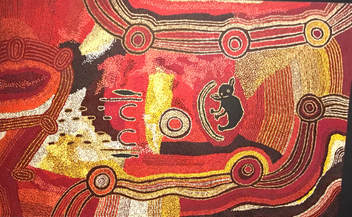 As western society, in a few places, begins to admit (and hopefully address) some aspects of our own male violence and abuse, will we learn to recover old, and create new, stories and images of what matters? Among other aspects of the Songlines exhibition in Canberra, this came home to me again strongly as I was once more struck by the power of the female in ancient storytelling. The powerful moral and cosmological (Seven) Sisters stories for example are told in many ways in different places, including with strong resonances outside Australia (from where the number seven among the sisters may partly have arisen). In the west of Australia the sisters are thus called Minyipuru. As they travel east however, out of Marlu country into the lands of the Ngaanyatjarra and the Pitjantjatjara and Yankunytjatjarra, they become known as Kungkarrangkalpa and Kungkarangkalpa. The details profoundly matter of course, yet they also share so many common themes, not least those of women's survival, resilience and ingenuity in the face of male threat. For the sisters' journeys include pursuit by a male, also known in different places by different names. This man, to try to realise his lust and love, is a shape-shifter. So the story is partly a colourful battle of wits between the male and females, involving all kinds of subterfuges, adventures, and stratagems. Told as they have been for tens of thousands of years, these richly layered stories thus enable both men, and especially young women, to come to terms with our human needs and struggles: sharing a realistic portrayal of the interplay of desire and exploitation, power relationships and flexibility of action. Women are not idealised but their capabilities, and their weaknesses, are no longer buried. They, together with men, become active participants in their moral choices and aware nurturers of one another. As the Aboriginal women of the Songlines exhibition put it, in relation to the painting of Yaritji Young of Tjala Arts (above): We are all kangaru pulka: big sisters to the young women. Like in the Seven Sisters story we must teach and protect our young sisters This is so much more powerful when the story and its morality is enacted in so many different ways. For, as Tjunkara Ken, Yaritiji Young's sister, has said: I hold my father's story. I hold my mothers' story... (it) doesn't come out of paper or out of a book. It's coming out of the ground here. (My way) is different. It comes from the inside out. How will each of us make female dignity a grounded matter of 'inside out'? Such stories also of course have resonance in western traditions, not least in the Bible, where similar comparisons might be drawn to tricksters like Jacob and powerful women such as Deborah and Judith. Indeed, like any living and enduring spiritual stream, despite its deeply patriarchal traditional limitations, Christianity also has its own share of female stories of wisdom, resilience and empowerment. How often however do we hear, sing, dance and embody them, and create new ones? As, so painfully slowly, we come to terms with the damaged feminine in our culture - and above all with the brutal realities and 'hidden' denied abuse of so many women's lives - it is surely time, further prompted by the sisters and the ancient wisdom of the Songlines, to tell and live them. Humpty Dumpty sat on a wall.
Humpty Dumpty had a great fall. All the Pope’s horses and all the Pope’s men (and women), couldn’t put Humpty together again. For good and ill, the era we know as the Reformation has hugely shaped us. It involved immense fragmentation: both a breaking down and a breaking open. Like Humpty Dumpty, that which went before had ‘a great fall’ and could not be put together again as it had been. Especially within Christian life, it has thus bequeathed so many features we simply take for granted. Some have lasting value. Others are much more questionable. This includes the very existence of different Christian traditions, in what, from the 19th century, we have termed denominations. This was not, of course, an intended outcome. Indeed, it would have seemed anathema to any Reformer, as well as to the Church of Rome. Yet it is part of our Reformation inheritance. So what do we make of this, for God’s continuing mission? What is worth keeping? How might we move on together? This reflection is not a traditional potted history. Nor does it seek to draw us into comparisons of our different Christian traditions, never mind reassemble past dynamics and rhetoric. Instead, it outlines briefly both vital differences and also important similarities between that age and our own. In doing so, it identifies a number of negative features which often mar our churches and world. It also suggests a number of positive features which can heal and take us forward. Hopefully, in the contemporary spirit of ‘receptive ecumenism’, these may then provide a basis for assessing which Reformation gifts we will own together and which we will leave behind. What else, we might then ask, do we need for our journey onwards today?... It is baffling and frustrating to hear some politicians, media and other leaders talk about a lack of Muslim response to terrorist and other Islamist-linked outrages. It seems as if sometimes people simply only want to see and hear what they want to see and hear. Earlier last week the following open letter from our Islamic community to our local Toowoomba Catholic bishop was received by myself and other faith and community leaders. It speaks of the continued revulsion of almost all Muslims to acts such as the recent killing of Father Jacques Hamel and the deep shared commitment to peace and humanity...
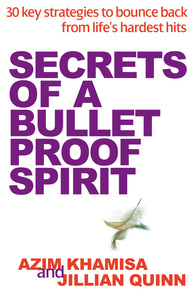 When some people question me about religion and violence, and especially Islamist related violence, I often think and talk to them about Azim Khamisa, one of the most inspiring people I have ever met. A successful international financier and Sufi Muslim, Azim's life was turned upside down when his twenty year old son Tariq was shot and killed, for the price of the pizza he was delivering. Yet, out of the midst of his terrible anguish, an amazing compassion, rather than commitment to vengeance, arose. Azim came to realise, as he puts it, that there were 'victims at both ends of the gun' that killed his son, and this spirit-led understanding drove him to contact the family of his son's killer (whom he then later met and has lobbied for) and to commit his life to sharing the power of forgiveness, particularly among millions of young people vulnerable to gang culture and other pathways to violence. His mission is especially embodied in the Tariq Khamissa Foundation but has also been exercised internationally through books and other communications tools and events of various kinds (including his own website found by clicking here). When I think of the message and example of Jesus, Azim is an amazing contemporary model. A little of his story can be found in this video clip: 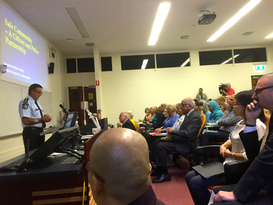 After the recent bombings in Paris, our Toowoomba Gooodwill Committee leadership decided to hold a gathering to bring together community leaders to strengthen our social cohesion and resilience. Held at the University of Southern Queensland this was well attended, facilitated by Professor Michael Cuthill and expert in research on social cohesion. Speakers also included the Mayor of Toowoomba Cllr Paul Antonio, Inspector Mike Curtin from Queensland Police Service, Venerable Wu Ping from Pure Land Learning College, Professor Ken Udas from USQ, and university student Sophie Ryan. Bishop Cameron Venables also led an engaging question and answer session with the panel of speakers and contributions from the floor - not least a several positive contributions from members of the Toowoomba Muslim community. Key themes included positivity, whole community engagement, valuing diversity, partnership building, leadership into action, open and truthful education, and acknowledgement of the need to read sacred scriptures and traditions in context and with a deep spirit of love and humanity, acknowledging potential 'texts of terror'. For my own introductory words as Goodwill chairperson click below on read more... 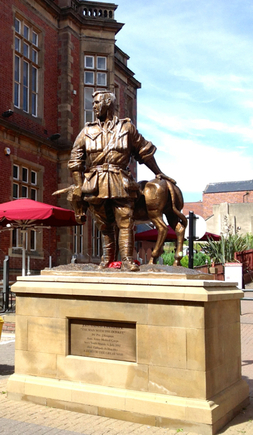 As an English Australian Christian, ANZAC Day has been, and remains, somewhat enigmatic. I appreciate, and am sometimes deeply moved, by aspects of it. Yet it often feels a little alien, particularly in its more recent forms: adding, as they do, extra nationalistic and even militaristic overtones to a developed myth which is itself somewhat sub-Christian, and at times even anti-Christian (when, that is, it over-exalts the very elements of blood-sacrifice and trajectories of human violence which Christ's work transfigures and ends). Generally therefore, I tend simply to let ANZAC commemorations pass by, except when I am forced to confront them: such as at the SCG one day at an AFL match, where the invasion of the pitch by a military parade and ritual was a powerful reminder of the sometimes problematic relationship between sport and violence (indeed I wondered what it would take, and what reaction there would be, to a peace march and peace ritual in the same space in a similar manner). As a proud and happy Australian citizen, I believe strongly in the right of my fellow Australians to hold and practice ideas and behaviours different from my own. I also rejoice in the virtues and outstanding stories of courage, resistance and mutual support in the ANZAC myth and I pray that these may indeed flourish in positive ways in our lives and world today. However I still often feel somewhat distanced. Are there, I wonder, ways forward to a more inclusive commemoration?... |
AuthorJo Inkpin is an Anglican priest serving as Minister of Pitt St Uniting Church in Sydney, a trans woman, theologian & justice activist. These are some of my reflections on life, spirit, and the search for peace, justice & sustainable creation. Archives
July 2024
Categories
All
|
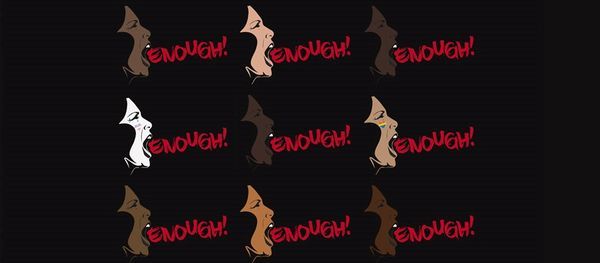
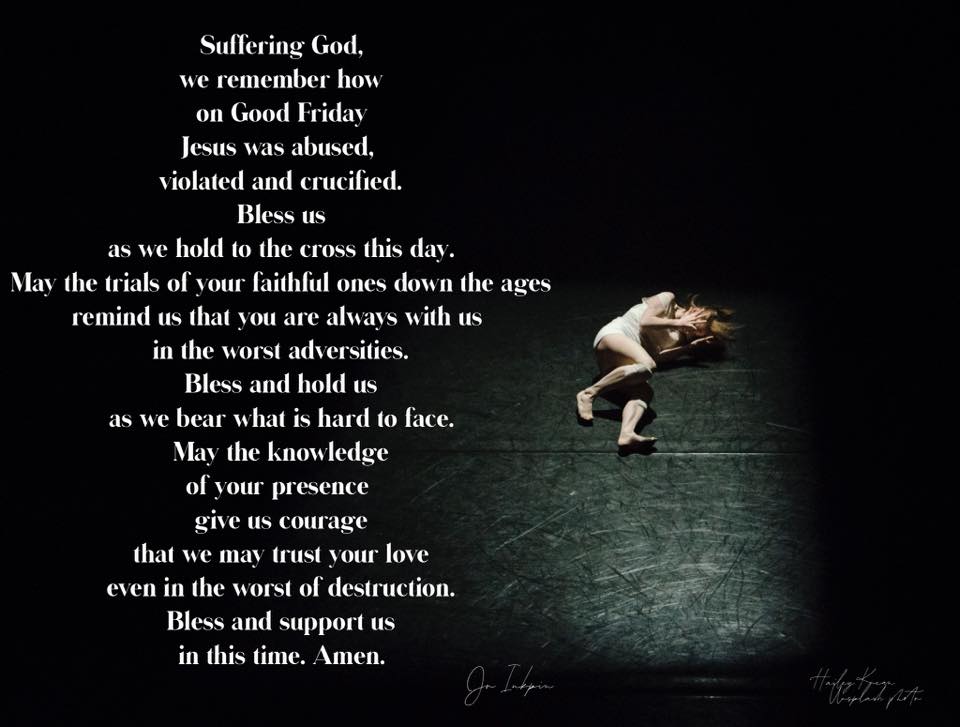
 RSS Feed
RSS Feed